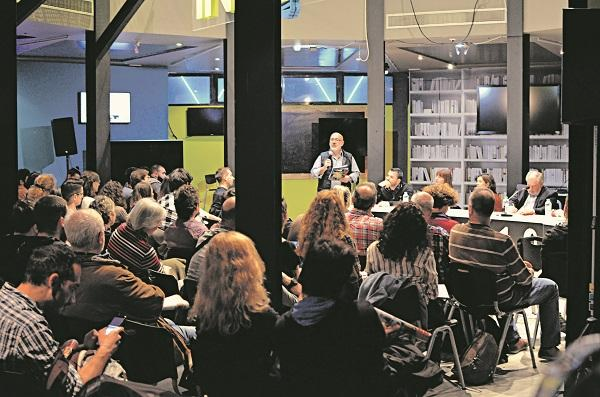On Tuesday, March 19th, the event on “Science & Technology in the Public Sphere” was co-organized by “Prism”, SciFY, and INNOVATHENS in Technopolis in Gazi. The event was attended by the Deputy Minister of Research and Innovation Kostas Fotakis, the director of the Institute of Informatics and Telecommunications of NCSR Demokritos Vangelis Karkaletsis, the president and director of the National Observatory of Athens Manolis Pleionis, the president of the National Bioethics Committee Eleni Rethymiotaki, and the president of the Board of Directors of the Pasteur Research Institute Fotini Stylianopoulou. Manolis Patiniotis, professor of Sciences History (EKPA) and member of the “Prism” editorial team, opened the event with an account of the two and a half years of the magazine, followed by a round table with the guests, moderated by Leda Arnellou and Dimitris Petakos. The event ended with audience questions to the guests. The discussion was extremely interesting, and the guest positions resulted in a fruitful dialogue.

Science journalism and public image of science
One of the topics discussed was the identity and quality of science journalism in Greece. It was pointed out that science journalism is in its infancy. One of the reasons for this phenomenon seems to be the lack of scientific training and education for journalists. As a result, articles with inaccuracies, stereotypical or outdated perceptions, and mental leaps are published. Also, as noted by M. Pleionis, several articles appear with seemingly scientific arguments defending pseudo-scientific positions. Misinformation is a major problem and a hindrance to democracy. It is no coincidence that behind misinformation and pseudoscience are political ideas from spaces with a diminished democratic sentiment. The panel discussed that we are far from debating the politics or philosophical approach of the different schools of science journalism.
Also, one of the more important problems is that there are scientists who articulate a public discourse that has nothing to do with science. These are cases of professionals promoting private agendas with financial and ideological motivations. Therefore, it is crucial to establish a framework where citizens will be properly informed. When citizens have valid information, they cannot be manipulated. The responsibility of journalists is not limited to the reproduction of news. It includes highlighting the scientific method, essential critical evaluation of scientific developments, cross-referencing sources, and a plurality of positions and opinions when negotiating controversial scientific issues or scientific controversies.
Science in education and society
The need for science education is essential in modern societies for many different reasons. The speakers highlighted this need through several examples. What is crucial is the institutional framework that makes scientific literacy possible and lasting. V. Karkaletsis pointed out that science education is one of the safeguards against technophobic and technophile ravings. Citizens are informed and educated in a way that makes them capable of evaluating with greater maturity and composure the technological and scientific developments and how they affect their daily lives. Even in non-formal education, the existence of structures and the possibility of exploiting financial and human resources are out of the question. In addition, informal science education must also be addressed to sensitive social groups, such as refugee children and correctional institutions, where the National Observatory of Athens, the Pasteur Research Institute, and NCSR Demokritos are leading the way with excellent educational actions by specialized staff.
Also, it was noted that in recent years, there have been important initiatives of the State through the coordination of forces, the increase of expenses for research, and the optimal utilization of human resources and infrastructure in the research centers for education issues. Deputy Minister K. Fotakis spoke about the emblematic actions that aim to have a visible and immediate social footprint. For example, actions concerning the establishing national networks of Precision Medicine in oncology and cardiology and preventing young sudden death are essential steps for a direct social imprint of science in society.
Science, society and democracy
The relationship between democracy and science-technology was the topic that occupied most the event. One of the axes of the discussion concerned the concept of co-production. Theories of co-production recognize the active role of citizens in the creation of new artifacts and the production of new knowledge. The relationship between society and science has always existed, said F. Stylianopoulou She referred to prominent examples where citizens had and have an active role in studying nature. In the modern era, dealing with science and technology is familiar to everyone. The part of non-scientist participation exists; it comes from below, from society, and it has its own dynamics. The scientific community often realizes these developments after the fact. Concerning citizen participation in research, many examples were cited where citizens co-shape the techno-scientific framework. For example, amateur astronomers are of great help in the search for new supernovae. Also, in the Informatics sciences, many citizens contribute to the collection of data and information, which scientists can gather and draw important conclusions or propose solutions to specific everyday problems. For example, the European program Your Data Stories, in which NCSR Demokritos also participated, aimed at the use of open government data by citizens.
Obviously, the participation and information of a citizen make them more democratically active. However, you cannot have such a participation framework everywhere. For example, one would never trust an amateur surgeon. It is critical, therefore, to recognize the limits of participation and co-formation. There are cases where the limits are blurred, and several argue that the Theory of Relativity does not apply, that the Earth is flat, that we should not make vaccines, etc. Therefore, it is necessary to have the right scientific training to recognize the limits of Citizen Science. The knowledgeable citizen is hard-pressed to be dominated by science. The negative role of the media was highlighted because the advertising of private places of medical services is allowed. Advertising creates a false impression of scientific superiority precisely because the goal is economic.
However, it wasn’t only citizen involvement in science that was noted, but also the opposite. That is, scientists must realize their role as responsible citizens who must share their work with society and put it at its service. Often, science does not deal with the real issues of society, something that distances it from it. As noted by E. Rethymiotaki, the point is to demystify our relationship with science. Scientists often act as if they exempt themselves from their research as if they stand above society. For example, even when we interfere with the genome, we think it does not affect us. This attitude is indicative of the technocratic framework within which some scientific research is cultivated and constitutes a distortion of democracy.
As M. Pleionis pointed out, every society has its own historical circumstances, and research can only be directed through them. Science is not neutral. This phrase was used by the Deputy Minister of Research and Innovation K. Fotakis, in his position on the relationship between democracy and science. It is a position that expresses and condenses the essence of scientific research, which inevitably captures specific needs, choices, and responsibilities that have a political sign. In a strict technocratic and capitalist framework, there is a belief that the market and labor are self-regulating. This belief misconceives even unemployment as something that will be dealt with by some invisible market forces. However, as the panel noted, that is not the case. Democracy cannot be placed in a technocratic context. How the scientific environment is shaped and how funding is done are political issues. Only if the criteria are political can knowledge have a democratic sign. The crucial thing is to create development conditions with an orientation towards reducing inequalities and a better quality of life for all. The answer, therefore, is which policy prevails.
Dimitris Petakos
Source: http://www.avgi.gr/article/10965/9756608/episteme-kai-technologia-ste-demosia-sphaira




